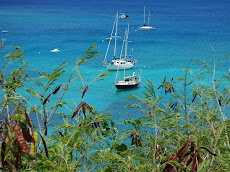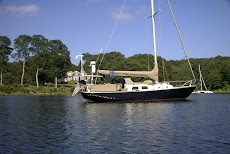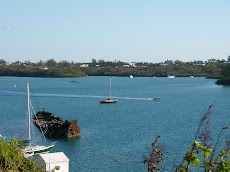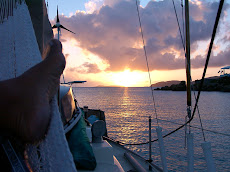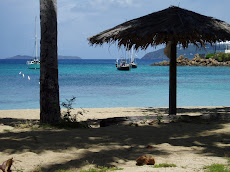
Of all the wonders presented by our changing world in the last century, none astounds me more than the increase in the amount of energy in various forms that each of us has available for our use and pleasure. Consider that before petroleum products, most of our heat, light, and transportation was derived from plants and animals, dead or alive. I’m sure there are too many of us in the world today to ever revert to those days, but there may be a place for some of the old ways of thinking about energy use. Few lifestyles are better suited to provide a demonstration of the polar opposite to conspicuous energy consumption than living aboard. I know that there are many options for controllable on board power production, but this is a discussion of how to work with the two most commonly harnessed variable resources – wind and solar energy.
I always advocate renewable energy devices with the cautious caveat that alternate energy requires alternate expectations. When connected to the grid, using energy in greater quantities rather than lesser simply means a larger energy bill at the end of the month. This is not in itself a bad thing as long as a balance is maintained. However it is a mindset that must be left behind if you are going to unplug for a while. What I refer to here is not simply a matter of switching off unused lights or lowering the thermostat at night. It is an overall comprehension that once the shore power chord is cast off, every use of energy is subtracted from that which you create and store. With time, the mental accounting becomes subconscious – like knowing when to turn back on a long walk so you can make it home. I am referring here to energy use as related to lifestyle and not necessarily that connected with navigation and sailing. That is a separate and different set of concerns. I won’t get into the plethora of gadgets designed to aid our perception of electrical energy in the manner of fuel in a tank.
 The matter at hand is the mental process of understanding that flow out cannot for long exceed flow in. For reasons obvious in the American economy, I will avoid any cross reference involving finance.
The matter at hand is the mental process of understanding that flow out cannot for long exceed flow in. For reasons obvious in the American economy, I will avoid any cross reference involving finance.The most significant step preparatory toward life unplugged is to catalog your energy outflows. This is a highly individual process, so don’t rely too heavily on someone else’s list. You should break your power uses into those which are discretionary, such as entertainment, and those which are relatively constant such as refrigeration and pumps. This will help you to move closer to an understanding of the difference between need and want in your power demand, although the longer you are out here, the more items you will shift from one list to the other. Since you need a starting point, it is only important to understand that larger your list of constant consumers is, the larger you investment in storage batteries and generating equipment will be to feed them.
I will start with one of the most thirsty and insatiable of the energy eaters; the chilly bin.
 For some, refrigeration is considered an unnecessary luxury and this discussion can be dispensed with. I find this attitude most prevalent in those from cultures which also promote warm beer drinking. Once upon a time, refrigeration was achieved by heating a liquid ammonia compound. Heat source refrigerators still exist, though they are out of favor afloat due to fire risk and a tendency to become vapor locked if not kept reasonably level. These days, we use mechanical compressors to create the desired effect. But compressors must be rotated and that requires a motor of some sort. Often, the duty of cold box sentry falls upon the main engine and so is outside of the realm of renewable resources. This road carries the unpardonable sentence of being aboard for the required number of hours per day to run the engine. For the rest, a balance must be achieved of amp hours consumed in proportion to size of the cold box.
For some, refrigeration is considered an unnecessary luxury and this discussion can be dispensed with. I find this attitude most prevalent in those from cultures which also promote warm beer drinking. Once upon a time, refrigeration was achieved by heating a liquid ammonia compound. Heat source refrigerators still exist, though they are out of favor afloat due to fire risk and a tendency to become vapor locked if not kept reasonably level. These days, we use mechanical compressors to create the desired effect. But compressors must be rotated and that requires a motor of some sort. Often, the duty of cold box sentry falls upon the main engine and so is outside of the realm of renewable resources. This road carries the unpardonable sentence of being aboard for the required number of hours per day to run the engine. For the rest, a balance must be achieved of amp hours consumed in proportion to size of the cold box.  Isotherm has created a DC electric refrigeration system based on the theory that it is more efficient to store ‘cold’ in a holding plate when more electrical energy is available than it is to store electricity in a battery. Their voltage sensing units are widely hailed as a boon to small battery bank cold beer lovers worldwide. The poor-man parallel solution on Charis involves keeping a supply of ice in the box and using the old Adler Barbour refrigeration unit to slow its melt when adequate energy is available. Local “ice-capades” are a cultural exchange opportunity and there are always rocks to clink in your sundowner.
Isotherm has created a DC electric refrigeration system based on the theory that it is more efficient to store ‘cold’ in a holding plate when more electrical energy is available than it is to store electricity in a battery. Their voltage sensing units are widely hailed as a boon to small battery bank cold beer lovers worldwide. The poor-man parallel solution on Charis involves keeping a supply of ice in the box and using the old Adler Barbour refrigeration unit to slow its melt when adequate energy is available. Local “ice-capades” are a cultural exchange opportunity and there are always rocks to clink in your sundowner.**Updates from the Deep: August 2012
The Isotherm ASU air cooled unit depicted and I have been shipmates for several years since I wrote this post. It is all I had heard it would be and more. It keeps silent watch over my batteries and sips the juice when power is scarce. It automatically ramps up and makes ice when the energy level is high. It has a rather unnerving auto-defrost schedule that can leave me concerned about food spoilage, but it's easily circumvented by powering down then up again. Alas, my "ice-capades" are a thing of the past.
Imagine an existence where your urge to watch TV becomes naturally in tune with the strength of the wind or intensity of the sun in recent hours. It may sound like cruel torture if you are a serial TV addict. On the other hand, if you can see it as the opportunity to work on the “must read” book list, you are getting the point. As an added perk, decreased exposure will alloy you to remain coolly aloof while land dwellers complain about, laugh at, and generally are intellectually twisted by bad commercials. Audio entertainment can be similarly classified, except that it is commonly less power thirsty. In both cases I have noted the critical transition to be that I no longer allow myself to consider them background noise. On board conversation quality has improved as a side benefit.
Some say I have a lighting fixture fetish after spending time on my floating home. There are fluorescent lights, incandescent lights, small directable reading lights, and oil lamps.
 I learned long ago that one light in the right place is worth 3 in the wrong locations and my power use for interior lighting dropped accordingly. I regard my gimbaled oil lamps as a more seaworthy cousin to candles for mood lighting, as well as good general background light exempt from the electron flow concern. If eyestrain is a worry, consider an LED book light to augment your other sources.
I learned long ago that one light in the right place is worth 3 in the wrong locations and my power use for interior lighting dropped accordingly. I regard my gimbaled oil lamps as a more seaworthy cousin to candles for mood lighting, as well as good general background light exempt from the electron flow concern. If eyestrain is a worry, consider an LED book light to augment your other sources.

While in most instances I have been able to use latitude and trade wind for my air conditioning needs, small electric fans
 have produced notable comfort at times. My favorites are small swivel mounted fans made by Hella. Their electrical consumption is almost unnoticeable and they move plenty of air with little noise. As with lighting, placement is significant and power use will generally be inversely proportional to the number installed.
have produced notable comfort at times. My favorites are small swivel mounted fans made by Hella. Their electrical consumption is almost unnoticeable and they move plenty of air with little noise. As with lighting, placement is significant and power use will generally be inversely proportional to the number installed.Life conspires to keep me from always choosing my geographic home, so I sometimes list heating on my necessity list. It was a long search to find a solution which fit my energy creation and storage capacity, but a huge lifestyle improvement when I did. (See Living Aboard January/February 2006.) I am fortunate in that the colder cruising months for me bring stronger winds, generally allowing the wind generator to compensate for the seasonal increase in electrical use. Now and then though, a movie is postponed in favor of a book and push button warm air.
For most, pressure water, sump, and bilge pumps are on the constant and necessary list. I do know some very well adapted liveaboards, however, who use gravity and muscle to power these needs. I will only say that I envy them every time I have to service one of my electric pumps. It can be difficult to estimate the thirst of these devices, and only experience is likely to teach you how much you will need to put back into your energy ‘tank’ to break even. Since you are assumedly also working on a similar thought process conversion relating to water use, this item tends toward its own solution. Less water use means less pump run time, and therefore less energy needs to be created to keep up.
Computers are our modern day Man-Friday. It’s not easy to imagine life without them anymore. I’m sure there is a specific state of Nirvana reserved for those who find a way send “Windows” out the porthole, but sadly, most of us will never reach it. In the mean time, only you can decide where your electronic brain weighs in on the necessity scale. In the tropics, I have reached an easy compromise. It’s too hot at midday for maximum outdoor enjoyment, and my solar panels are generally making more electricity than my batteries will accept. Therefore I have reversed the whole siesta concept and find I now do my best work from noon to 1 pm while goofing off most of the rest of the day. It’s a compromise not entirely out of line with the reasons why I went cruising in the first place.
There will always be the odd incidental small power uses such as the propane gas solenoid and maybe a kitchen appliance or three. The reality is that these will either be fairly low in their demands for juice, or highly intermittent in their application. The compromises required to keep them fueled will be small if you are already making some of the bigger choices discussed. Again, the significance of the issue is that you are aware of both the result of pushing the on button and the cost in terms of energy consumed.
There is a slow but noticeable shift in perspective beginning to occur even among conspicuous consumers. Gradually we are waking up to the reality that we must be more accountable for our personal energy appetites. The change has to take place slowly to keep our economy rolling along in the immediate, but it must certainly occur to keep it alive in the long term. As liveaboards we are afforded the opportunity to lead in the thought conversion that will allow this to occur, while improving our own lifestyle. It isn’t inexpensive to outfit your floating home with wind and solar power collectors, but it is a long term investment partially offset by absent monthly energy bills and otherwise justifiable with lifestyle improvement. The key to fully appreciating your return on the investment is to learn in advance how to feel comfortable within the varying range of energy your system will deliver.
The author’s Alberg 35, Charis, employs two Siemen’s M55 solar panels (flawless) and a SouthWest Windpower wind turbine (loud but productive) to channel renewable energy to a battery bank comprised of 3 group 31 batteries. The installation of numerous electric lifestyle gadgets is tolerated by the system since most of them are on the discretionary use side of the list.



